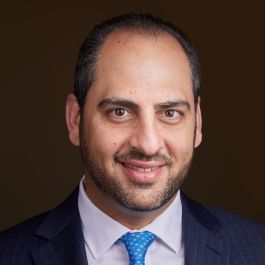Finance is an all-encompassing facet of life, impacting everything from where we choose to work and go to school to the avenues for achieving prosperity and stability.
According to a 2022 report by the Financial Health Network, only 31 percent of Americans were considered financially healthy in 2022, a 3 percent decrease from the previous year. Meanwhile, in a 2022 survey by the American Psychological Association, 65 percent of respondents said money was a significant source of stress.
In a world where finance plays such a dominant role, it makes sense that fintech is one of the tech industries’ most rapidly evolving sectors. As many struggle to achieve financial stability, fintech companies are providing tools to optimize investments, decrease debt, simplify complex processes and plan for the future.
With an eye on trends and ongoing developments, six NYC-based companies are helping individuals and organizations with a range of needs — from student debt reduction to portfolio diversification and beyond — harness technology and data to achieve financial success.
Their leaders shared what trends they’re keeping an eye on, the impacts these developments could have and the innovative work their teams are doing to find solutions to complex problems.
Trumid is a financial technology company and fixed-income trading platform that combines agile technology and market expertise to optimize the credit trading experience.
Fintech is an industry ripe with opportunities for innovation. What’s a new trend or evolution in the industry that you’re keeping a close eye on?
Electronification is increasing in every industry, including ours. Participants in our space are looking for a one-stop shop to access data, analytics and execute trades. Solutions that can execute and process trades — and simultaneously support the ever-increasing data-driven demands of the market — are moving to the forefront. A growing electronic trading community is seeking tech-driven solutions to help optimize the decision-making process and trading experience.
Our market was born from a place where trades required back-and-forth conversation, and there was comfort in that. What’s changed is that technology has enabled us to consume and seek information quicker than ever before. The newest generation of market participants are tech-savvy value seekers, expecting speed and efficiency. These users were raised in the age of on-demand. That’s where a platform like Trumid comes in. We are developing tools that build off traditional trading methods, where relationships are a must, while helping to push the market forward by offering easy access to data and intuitive product design.
What impact will this trend have on the industry as a whole or, more specifically, on your company and the work your team is doing?
We anticipate that continued electronification will drive two key trends. The first is strategic collaboration, which we believe is one of the most efficient ways of accelerating enhancements and advancing functionality. I expect to see a lot more of this in the next few years, and it’s certainly a focus for us at Trumid. To deliver an ever-improving trading platform to our clients, we recognize the importance of collaborating with peers and industry experts — driving best-in-class technology solutions and maximizing our creative potential.
To deliver an ever-improving trading platform to our clients, we recognize the importance of collaborating with peers and industry experts.”
The second is ensuring that we can quickly move innovations into production to meet our clients’ needs. Electronic credit trading is growing at an incredible rate, and we have to advance our technologies at the same pace. Our collaborative approach to innovation and agile technology stack work side-by-side, allowing us to innovate and iterate at scale. We combine client feedback with domain expertise to move quickly and efficiently, adapting to the changes we see or anticipate are coming. We’ve maintained a startup mentality, remaining nimble as we grow. All ideas are welcome and heard at Trumid. It’s an energizing culture in which we collaborate to find solutions and work together to rapidly deploy enhancements to our platform and ultimately create a great user experience.
Tell us about some of the innovative work your team is doing. What’s a project your team worked on recently that really embodies your vision for the future of fintech?
The launch of list-based trading protocols on Trumid is an important milestone for us. Our goal is to find a way to translate this data-enriched workflow into easy-to-view impactful insights and to deliver an electronic solution for our clients to negotiate back and forth on a list level. A sophisticated user experience where you don’t even have to think about the technology, science and design innovation that has been engineered into the back end.
A project like this takes a broad skill set to achieve. That’s what makes Trumid, a fintech focused on credit trading, so innovative, and where we see the collaborative future of fintech heading. We combine market expertise with tech, product and UX design knowledge from a variety of industries to enhance current market solutions with features that modern-day electronification may have left out. We can rewrite current offerings, bringing collaboration back into the story to deliver a differentiated trading solution, as determined by our users.

Order.co is a spend efficiency platform that helps businesses track and place purchases across their vendors and make purchases in a single bill.
What’s a new trend or evolution in the fintech industry that you’re keeping a close eye on?
The trend I am most excited about is probably the shift we are seeing in how businesses can access capital — embedded finance. Traditionally, banks dominated the space with rigid loans with a slow, paper-based process to get approved. B2B software companies, like Order.co, can now embed financing inside the software that businesses use every day. With real-time access to data and low acquisition and servicing costs, embedded finance delivers businesses faster access to more creative financing while transforming the B2B software company into a fintech.
With real-time access to data and low acquisition and servicing costs, embedded finance delivers businesses faster access to more creative financing.”
What impact will this trend have on the industry as a whole or, more specifically, on your company and the work your team is doing?
We want to be at the forefront of this trend and have launched a cash advance product open to any business on the platform. The highly flexible structure allows us to offer our businesses fast turnaround times on cash advances they can use to fund operations, open a new location or finance a marketing blitz. We then align repayment with business cash flows to make sure we never cause a liquidity crunch. All of this is done completely transparently with one upfront fee and no hidden charges.
Tell us about some of the innovative work your team is doing. What’s a project your team worked on recently that really embodies your vision for the future of fintech?
Much of the innovation we work on revolves around better access to and more efficient use of data. We have found that even with a complete picture, making decisions to run a business is hard, so anything we can do to improve a team’s visibility and control of their finances and operations is a win. Our vision of the future of fintech in the B2B space is an integrated solution to help your business make the best decision possible on what you buy, the way you buy and the way you pay.
Yieldstreet’s platform provides investors with access to asset-based investments beyond the stock market, enabling them to diversify and strengthen their portfolios.
What’s a new trend or evolution in the fintech industry that you’re keeping a close eye on?
Fintech, like many industries, is undergoing a transformational shift with the integration of hybrid technology and human components. As a large direct-to-consumer private market investment platform, Yieldstreet has been helping people modernize their investment portfolios since 2015 using a technology-driven and digital-first investor experience. While the digital trend to alternative investments (aka private market investments) has become increasingly popular at Yieldstreet — to the tune of over $1.4 billion invested since our beginnings — fintechs like us nevertheless seek to offer their investors a more personalized service that combines the best of both worlds.
With the advent of the Private Client Group (PCG), we have quickly confirmed the importance provided by a human touch in addition to a world-class digitally native experience.
Tell us about some of the innovative work your team is doing. What’s a project your team worked on recently that really embodies your vision for the future of fintech?
Associates on the PCG team, all of whom left a more traditional wealth shop for Yieldstreet, provide our investors with a level of emotional intelligence, empathy and experience that technology alone cannot provide. Our team is a chat or call away to help investors navigate the world of alternative investing. Our seasoned team of professionals can listen and explain the alternative investment strategies available to grow one’s wealth.
Associates on the PCG team provide our investors with a level of emotional intelligence, empathy and experience that technology alone cannot provide.”
We focus on providing a more personalized experience than the typical digital platform. PCG offers Yieldstreet investors a white-glove service experience and educational resources for our investors in order to make more informed decisions.
I believe empathy and an investor-first mindset is key when it comes to having a successful team and making an impact in our space. Right now, the team is traveling to different cities to meet our investors, get to know them better over dinner, and attend different events with the goal of forming relationships. The Private Client Group is dedicated to building strong relationships and helping investors access the superior returns of private market investments. And we're hiring!
Octane aims to bring fast and fair lending to as many people as possible through its instant financing platform.
What’s a new trend or evolution in the fintech industry that you’re keeping a close eye on?
Fintechs are increasingly focused on two areas: sustainable economics earlier in the business lifecycle and fairness in how business strategy is applied to customers. The market and employees have less patience for strategies that may only work at scale, so fintechs are proactively preparing for macroeconomic headwinds and unexpected shifts from the beginning. At the same time, equitable, unbiased lending and AI decisioning are top-of-mind for all stakeholders, including regulators, investors and customers. Fintechs are focused on ensuring that they have the tools, technology and partnerships in place to be fair in all aspects of their business — especially when it comes to how their business strategy affects customers.
What impact will this trend have on the industry as a whole or, more specifically, on your company and the work your team is doing?
These trends are both driving and a result of an increased focus on model-based business strategies and automation. At Octane, our goal is to responsibly expand credit coverage to more underserved customers and to do so in a way that is as quick, easy and seamless as possible. We have and continue to invest in machine learning models and automations to achieve these goals.
At Octane, our goal is to responsibly expand credit coverage to more underserved customers and to do so in a way that is as quick, easy and seamless as possible.”
Tell us about some of the innovative work your team is doing. What’s a project your team worked on recently that really embodies your vision for the future of fintech?
We’re committed to responsibly expanding credit to help more people do what they love, so we’re continually innovating to provide the best end-to-end buying experience we can. For example, we recently developed and deployed a new credit model that expands credit coverage and has no significant disparate impact, outperforming FICO and Vantage in expanding coverage and providing a more seamless experience. When paired with our automated document processing and express closing process, this credit model yields a fair, fast and fun experience for our customers and helps dealerships close more deals.
January is a fintech company that sets a new standard for humanized debt collection. Its tech-enabled platform improves recovery rates and sets creditors and borrowers up for success.
What’s a new trend or evolution in the fintech industry that you’re keeping a close eye on?
Since the beginning of Covid-19, we’ve seen consumer savings dry up as pandemic-era welfare policies have vanished. As the savings rate fell from a peak of 34 percent in April 2020 to 2.4 percent, charge-offs have crept up from historic lows. In fact, the top four lenders have raised expected credit losses to their highest levels in the past decade. As a result, our clients expect an “avalanche” of delinquencies to materialize this year.
This will lead to a fundamental shift in how consumers approach investing, spending, and saving. As of February 2022, only 27 percent of households could cover expenses for more than six months, and only 21 percent could cover expenses for less than two weeks, according to research from the CFPB.
We expect a parallel shift in how lenders market to, underwrite, and service their borrowers. Lenders are tightening their lending standards. On LendingClub’s January 25th earnings call, CEO Scott Sanborn reported that the company has continued to tighten its underwriting throughout the year, with fourth-quarter near-prime volumes down more than 50 percent from their peak.
What impact will this trend have on the industry or, more specifically, on your company and the work your team is doing?
While delinquencies were at historic lows, lenders maximized lending, not contingency planning for when loans didn’t work out. As delinquencies skyrocket, lenders must rethink how they engage with borrowers who fall behind on their payments.
When times were good, we heard firsthand how teams responsible for contingency planning struggled to get resources. They described themselves as “rounding errors” relative to the lending arms of their respective businesses. As ineffective collections gnaw into lender margins and as the risk of mistreating borrowers introduces material brand risk in today’s climate, we believe that lenders can no longer afford to punt on putting the necessary collection and recovery resources in place.
We believe that lenders can no longer afford to punt on putting the necessary collection and recovery resources in place.”
That belief informs our work. We help borrowers regain financial stability while helping creditors modernize their collections.
Countless borrower anecdotes — as well as industry-leading borrower satisfaction ratings — and client success stories, confirm our approach works. As we’ve engaged with millions of borrowers to help them through their financial challenges, we’ve introduced a new standard of compassionate, effective, and compliant collections in our industry.
Tell us about some of the innovative work your team is doing. What’s a project your team worked on recently that really embodies your vision for the future of fintech?
We’ve launched numerous projects to improve our efficiency and compliance as well as the financial health of borrowers. I’ll share one recent success story. When borrowers’ accounts are overdrawn, their financial institutions will frequently charge them “overdraft” fees, typically around $30 per transaction. We worked with Plaid, a popular fintech company, to implement an overdraft protection program. Months later, borrowers have avoided hundreds of thousands of dollars in fees thanks to this work. Projects like this exemplify our efforts to improve our efficiency, compliance, and the financial health of borrowers.
The future of consumer finance relies on trustworthy and transparent relationships between lenders and borrowers. This is especially true for borrowers who are behind on their bills. We are building and rehabilitating relationships through personalized outreach strategies that resonate with a borrower’s unique financial situation. In parallel, we are introducing a new standard of compliance through a codification of countless rules and regulations. Our approach ensures compassionate collections. We’re already seeing the results for borrowers and lenders every day.
Summer’s mission is to help those burdened by student debt save time and money. The company’s platform provides smart tools and customized recommendations to borrowers.
What’s a new trend or evolution in the fintech industry that you’re keeping a close eye on?
Student debt is holding back Millennials and Gen Z from being able to invest in their retirement as compared to previous generations. Student loan payments average about $450 per month, putting millions of borrowers in the tough position of having to decide whether to pay down their debt or save for the future. As a result, many borrowers are missing out on the powerful benefit of compound growth when investing in retirement early in their careers.
With the passage of the Secure 2.0 Act in December, student loan borrowers will no longer have to make this trade-off. Under Secure 2.0, borrowers can make payments toward their student loans and receive a one-to-one match toward their retirement savings up to the match threshold offered by their employer. We’re really excited about this new opportunity, which will go into effect this upcoming January and is likely to change how millions of Americans approach their retirement savings plans.
What impact will this trend have on the industry or, more specifically, on your company and the work your team is doing?
Summer provides comprehensive student loan and college savings assistance to hundreds of thousands of families, accelerating their journey toward financial well-being. The new Secure 2.0 law allows us to help individuals reach their financial goals even faster, and we’re excited to incorporate this benefit into our broader offering for partners.
The new Secure 2.0 law allows us to help individuals reach their financial goals even faster, and we’re excited to incorporate this benefit into our broader offering for partners.”
We expect significant uptake of this student loan retirement match benefit among employers, who will be able to contribute to their employees’ retirement plans in a way that is both budget-neutral and tax-advantaged. We also expect 401(k) and 403(b) recordkeepers to play a major role in bringing this benefit to life for their employer clients.
We’re actively partnering with employers and recordkeepers to educate the market about this opportunity and ensure it is implemented seamlessly into current retirement programs. Doing so will allow employers to take advantage of this new way for their employees to save for retirement as soon as possible.
Tell us about some of the innovative work your team is doing. What’s a project your team worked on recently that really embodies your vision for the future of fintech?
While there are over a dozen federal programs and hundreds of state programs to reduce student debt, the application process is hard for borrowers to navigate. For most borrowers, the complex rules and frequent policy changes hinder access to the very programs that were designed to help them conquer their debt.
At Summer, we believe in the power of automated finance to simplify the process and maximize savings. Our product automatically guides borrowers to the best repayment plan for their unique situation and helps them enroll in programs that reduce their debt burden. We’re also able to adjust our algorithms to quickly respond to new programs and policy changes, so borrowers don’t have to keep track of changes. Following the announcement of President Biden’s Loan Forgiveness program last year, Summer was the first to market with a product that enabled borrowers to assess whether they were eligible under the announced plan and help them enroll in it.
There are many applications of how automated finance can improve consumers’ lives, and we’re excited to simplify the complexities of the broader financial wellness ecosystem over time.



















